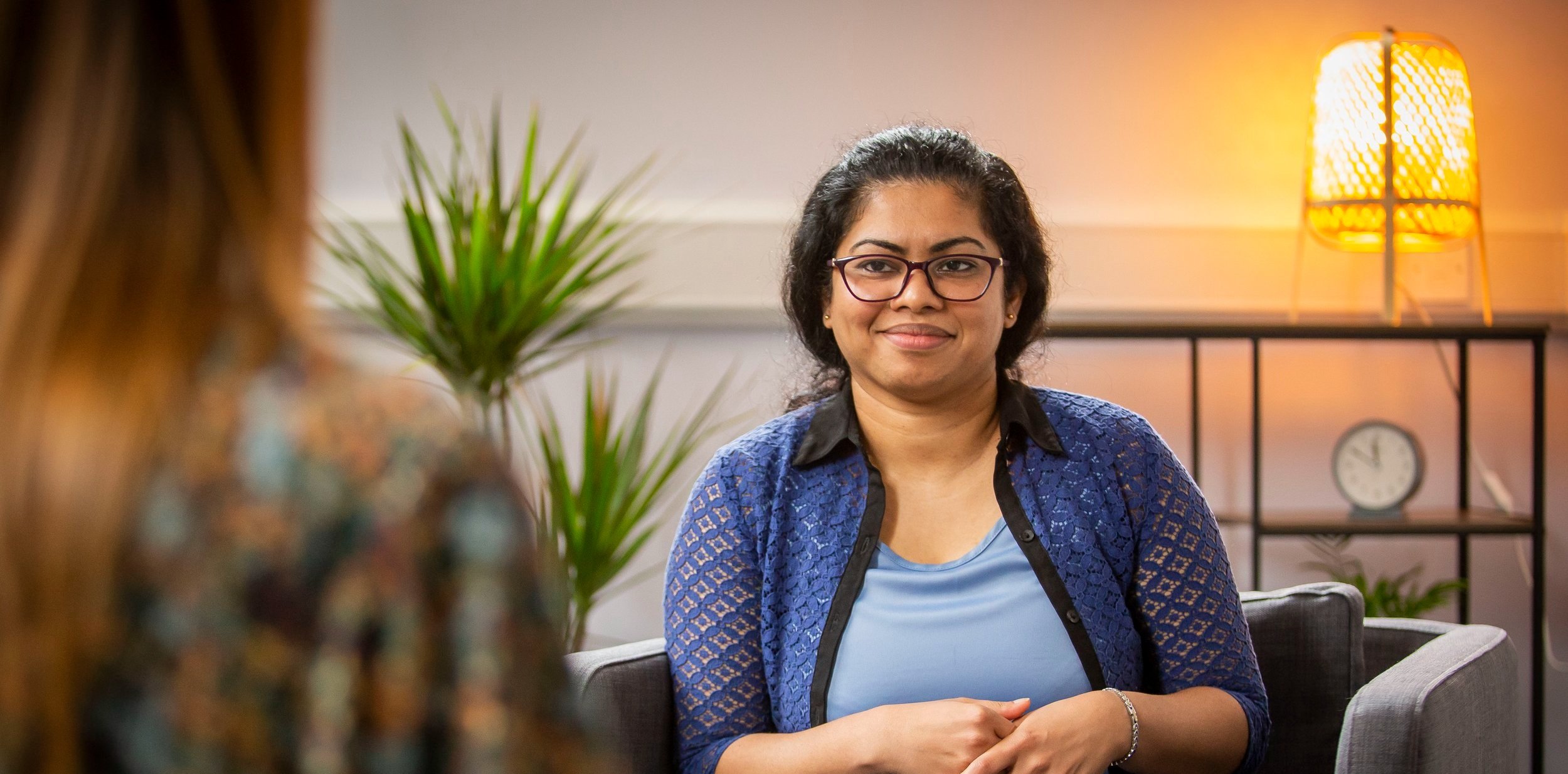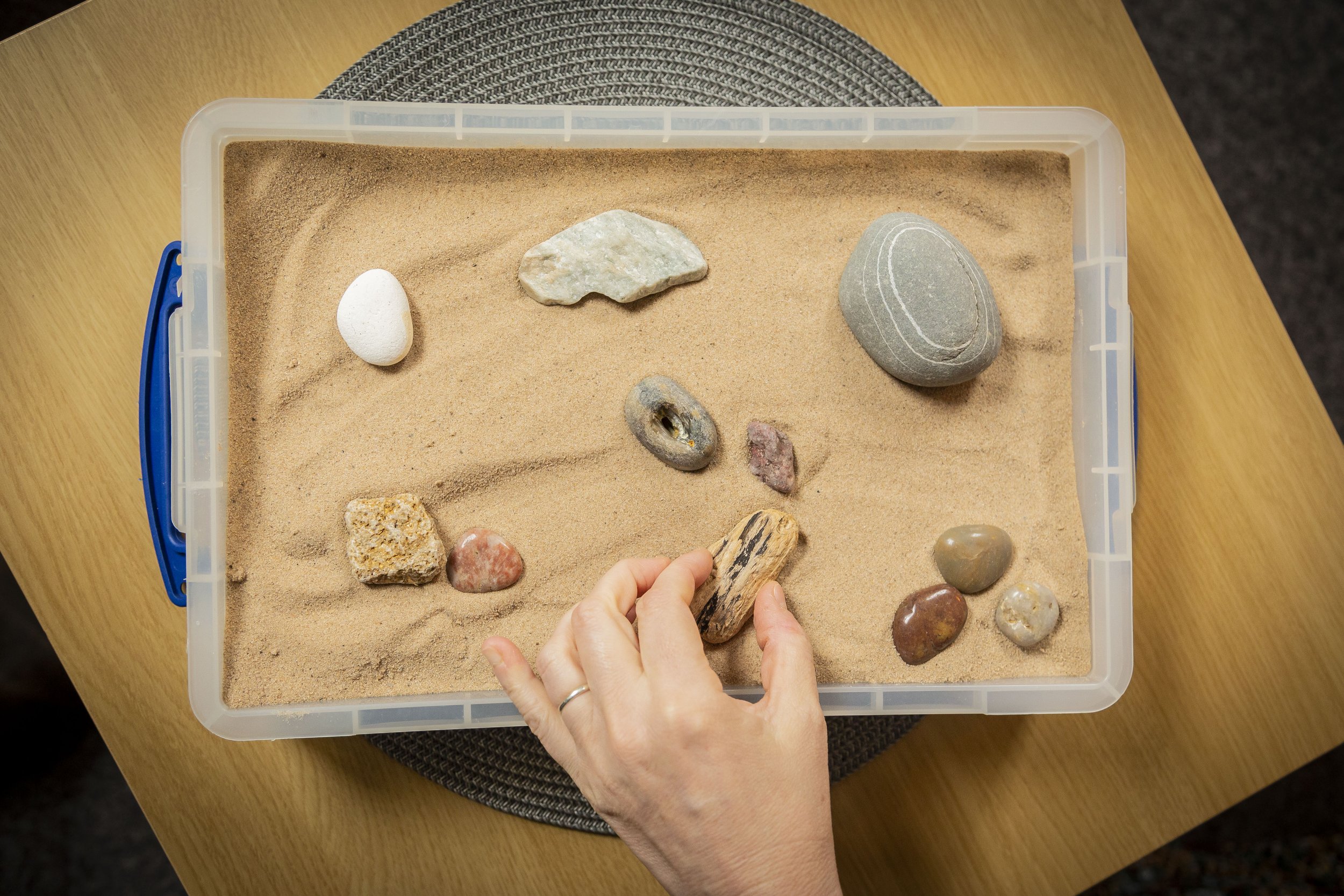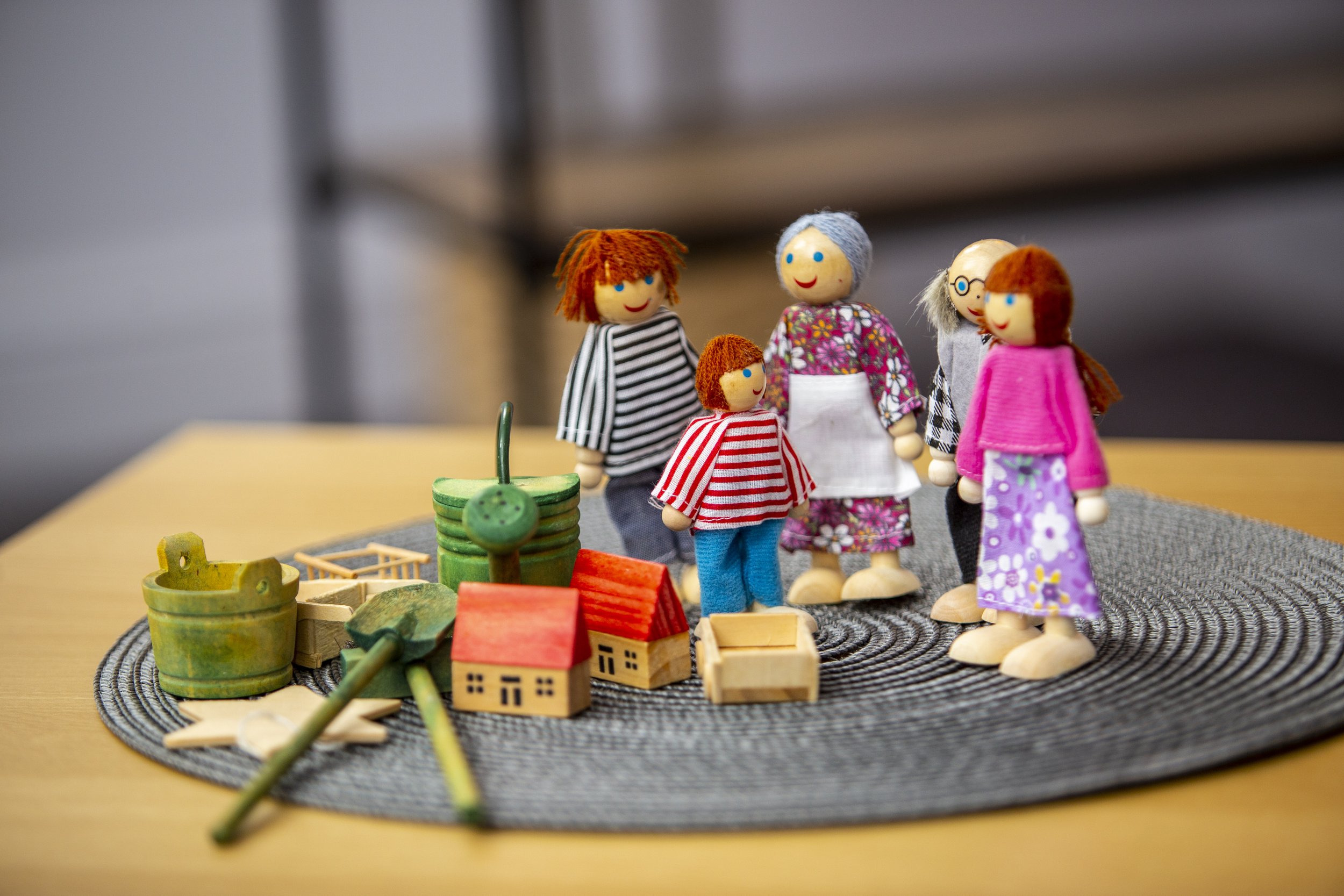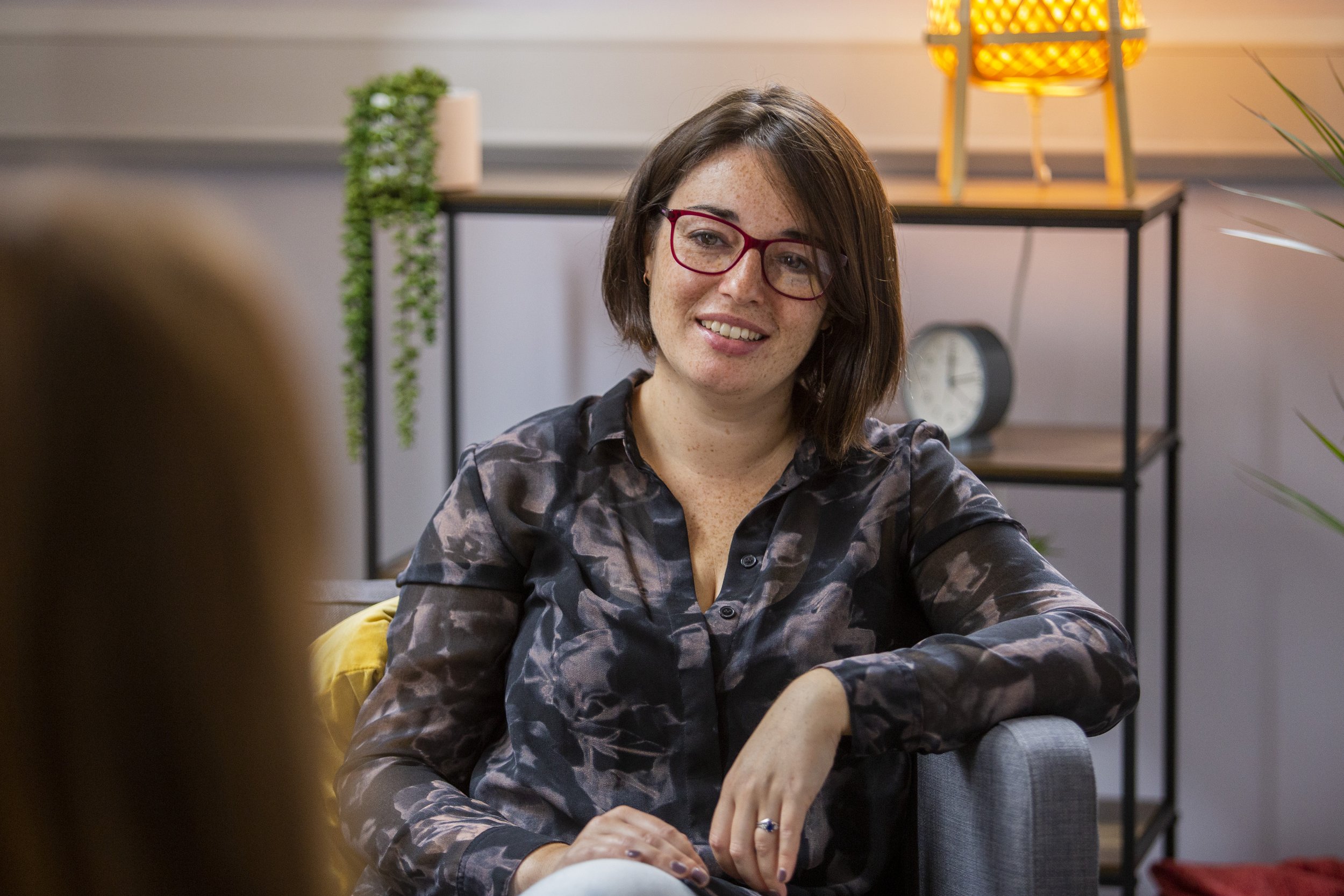
Get help
Demand for our services means that our waiting list may currently be closed, or you experience a wait between your assessment and the start of counselling. We hope that you will not be without support for too long. In the meantime, you may find useful information here on our helpful resources page.
What is counselling?
Counselling falls under the umbrella term ‘talking therapies’ and allows people to discuss their problems and any difficult feelings they encounter in a safe, confidential environment. The term can mean different things to different people, but in general, it is a process people seek when they want to change something in their lives, or simply explore their thoughts and feelings in more depth.
A counsellor is not there to sit you down and tell you what to do. Instead, they will encourage you to talk about what's bothering you in order to uncover any root causes and identify your specific ways of thinking. The counsellor may then look to create a plan of action to either help you reconcile your issues, or help you to find ways of coping.
What can counselling help with?
Counselling can be useful for anyone who wants to explore the way they're thinking or feeling further, as well as for anyone experiencing a problem or issue they are keen to resolve. People may choose to speak to a counsellor because they feel they cannot speak to their other half/friends/family about such personal issues, or they may simply wish to speak to a professional with an objective viewpoint.
Counselling can help you cope with:
a mental health condition, such as depression, anxiety or an eating disorder
an upsetting physical health condition, such as infertility or suffering from a long-term illness
a difficult life event, such as a bereavement, relationship breakdown or work-related stress
trauma, such as being involved in an accident or if you have been the victim of abuse
an addiction, whether physical or linked to a substance or activity
difficult emotions – for example, low self-esteem or anger
other issues, such as sexual identity






Different types of therapy
When it comes to counselling there are a range of different approaches or therapies that can be used. The type of therapy used will depend on your counsellor's preferences, the issues you are facing and what type of person you are. Most counsellors won't decide on a therapy type until they have found out more about you, the problems you face and the way you think.
The more common types of therapy include:
Art Therapy
Taking an alternative approach to counselling, art therapy encourages clients to use artistic methods to communicate their issues as well as words. This may be in the form of a painting, a sculpture or even a simple drawing. The aim of art therapy is to examine the resulting pieces of art and to interpret their meaning.
Dramatherapy
Dramatherapy uses metaphor to offer a safe space in which difficult issues can be looked at without being threatening and without causing further trauma. Although Dramatherapy is a psychological therapy, it is used and accessed by people in a whole range of settings. Clients within a Dramatherapy session have access to a whole range of tools to support them and enable them when exploring thoughts and feelings, such as; play, imagery, materials, stories, drawing, poetry and text, art activities, music, role play, improvisation, mask work, movement, puppetry.
Behavioural therapy
The principle idea behind behavioural therapy is that our behaviour is learnt and can essentially be unlearnt. This leads behavioural therapy to focus more on the present as opposed to looking back to the past. This type of therapy is, therefore, best used with those looking to change their behaviour, for example, sufferers of addiction or those with a phobia.
Cognitive therapy
The way we think often leads to changes in our behaviour, and cognitive therapy looks to reconcile issues where they begin - in our thoughts. The therapy looks to address any skewed ways of thinking that may be occurring and eventually aims to replace them with healthier, more positive thought patterns.
Cognitive Behavioural therapy (CBT)
CBT looks to combine both cognitive therapy and behavioural therapy in order to tackle the thought process and the resulting behaviour. Focusing on the present, CBT is a practical therapy that aims to break down problems into smaller, more manageable issues. This therapy is especially useful for those with more specific problems as it addresses each emotion separately.
Eye movement desensitisation and reprocessing (EMDR)
EMDR is is a therapy used to help people recover from distressing events and the problems they have caused, like flashbacks, upsetting thoughts or images, depression or anxiety. EMDR is best known for treating post-traumatic stress disorder (PTSD) and it can also help with a range of mental health conditions in people of all ages. The therapy involves recalling the distressing event/feeling while following the therapist’s finger as it moves from side to side. The aim is to reduce the intensity of these memories over time and you can read more in our simple leaflet here.
Humanistic therapies
The humanistic approach is holistic in style, looking at factors such as free will, creativity and human potential. The therapy type encourages self-exploration, with many varieties focusing on the 'here and now'. Therapies that fall under this umbrella include Human Givens therapy, person-centred therapy and Gestalt therapy.
Psychoanalysis
One of the oldest therapies used in psychology; it was Freud who founded the psychoanalytic technique. The therapy takes a different approach to behavioural and cognitive therapies as it perceives our thoughts to be out of our conscious control. Instead, psychoanalysis believes any psychological issues stem from childhood and need to be addressed in order to be resolved.
What types does YWCS Offer?
At York Women’s Counselling we currently offer the following types of therapy:
· Drama therapy
· Behavioural therapy
· Cognitive therapy
· Humanistic therapies
· EMDR therapy - read more information here
What to expect from counselling and our process
Step 1:
Complete the YWCS waiting list form or call the YWCS office
At this first stage, we will register your details, including your name, contact and address details. Please see our full Privacy policy here. We will not ask any information regarding your situation/reasons for seeking counselling at this point.
Step 2:
Telephone Assessment
You will be contacted by a qualified counsellor to gain a fuller understanding of what’s worrying you and what you hope to gain from counselling. All of the information here will be used to help decide whether YWCS counselling is appropriate for you and which of our counsellors may be the most appropriate to support you. Some questions you may be asked include:
Why are you seeking counselling? – This is your opportunity to discuss exactly why you are seeking counselling and what you hope to gain from it.
What is your current situation and personal history? – It is important to let your counsellor know your current situation, this includes any day-to-day issues you are facing and even your work and home life. Discussing your personal history will give your counsellor a chance to understand more about you as a person and why these issues may have occurred.
What symptoms are you experiencing? – Whether these are physical or psychological, it is important to discuss any symptoms with your counsellor.
We aim to complete your telephone assessment within 2 weeks of your enquiry. Telephone assessments last approximately 30-40 minutes.
Step 3:
Begin your counselling with YWCS
Following your telephone assessment, you will be contacted directly by a YWCS counsellor to invite you in to begin your counselling once they have an available appointment for you. Due to the pandemic, we are currently offering online counselling in addition to some face to face appointments. You will be able to choose.
Your counsellor should establish some clear boundaries when you begin your sessions that cover the following:
dates and times of the counselling sessions
confidentiality agreement
clarification of the professional nature of the counsellor/client relationship
how and when the counsellor can be contacted outside of sessions
At your appointment, you’ll be encouraged to talk about your feelings and emotions with a trained therapist, who’ll listen and support you without judging or criticising. The therapist can help you gain a better understanding of your feelings and thought processes, and find your own solutions to problems. But they won’t usually give advice or tell you what to do.
In your first session, it’s likely that your counsellor will ask you some questions in order to gain an understanding of what’s worrying you and the way your thought processes work. All of the information obtained here will be used to help you in future sessions. The counsellor will have the notes from your telephone assessment but may also cover some of the areas of questioning covered in your telephone assessment in more depth, to fully understand the issues you are trying to deal with.
It is advised that you be honest and open when answering these questions in order to get the most out of your counselling sessions.
During your counselling experience, you should aim to build a trusting relationship with your counsellor so that you feel safe and confident discussing your worries.
Counselling often requires you to discuss upsetting emotions and painful memories. Bringing up these thoughts can feel difficult to start with and initially, you may feel worse. This process is necessary to move forward and in time, you should start to feel better.
To get the most from your counselling sessions you should aim to make them consistent. Some sessions will feel more helpful than others, but it’s important to realise that everything your counsellor is doing is designed to help you in the long run, even if it doesn’t feel like it in the beginning.
It’s also worth remembering that counselling is not a quick fix, and that your counsellor will not be able to tell you what to do. The counselling process requires a strong relationship between you and your counsellor and a degree of effort on your part – together these two elements create a successful method to help you resolve your issues.
How much does our counselling cost?
York Women’s Counselling Service aims to provide affordable counselling to women who need our help. However as a registered charity we rely on the contributions from our clients to help sustain the work we do, so that we can continue to support more women. We therefore have the following payment guidelines:
Donation amount based on your employment status
Full-time - £55
Part-time - £35
Unemployed - £15
We also have a hardship fund available for women who are unable to make any contribution towards their counselling. The appropriate payment for your counselling will be discussed with you during your telephone assessment.
How many counselling sessions can I have?
You will have a review of how your counselling is progressing at week 6, 12 and 17 of your counselling, with a view to completing your counselling with YWCS up to a maximum of 20 sessions. Counselling that continues beyond 20 sessions will only be in exceptional circumstances.
Our expectations of you
As a YWCS client we ask that you:
Attend every session, unless there are exceptional and unforeseen circumstances that make it difficult to do so. This is important for you to maximise on your therapy, ensuring that you consistently focus on your counselling without long gaps in-between. If you don’t feel able to commit to attending counselling regularly, then it may not be the right time for you to start.
It’s also important for us as a charity – we receive a huge demand for our service, so we want to make sure that the women who are using the service are getting the most out of it and are not creating long delays in allowing other women to begin their counselling.
If you have to cancel an appointment, make sure you give us a minimum of 24 hours’ notice – this will ensure that our counsellors are able to plan their day accordingly, and our counselling room can be used for other people if possible. Any missed appointments count as part of your session allowance and must be paid for if the appropriate notice hasn’t been given.
Ensure that you have the agreed amount of money for your counselling (if applicable). This will be agreed at your telephone assessment stage, and will be collected by your counsellor at the end of each session.
Complete an evaluation on completion of your counselling: this will help us to understand more about the service we are providing, and where we can continue to improve.
